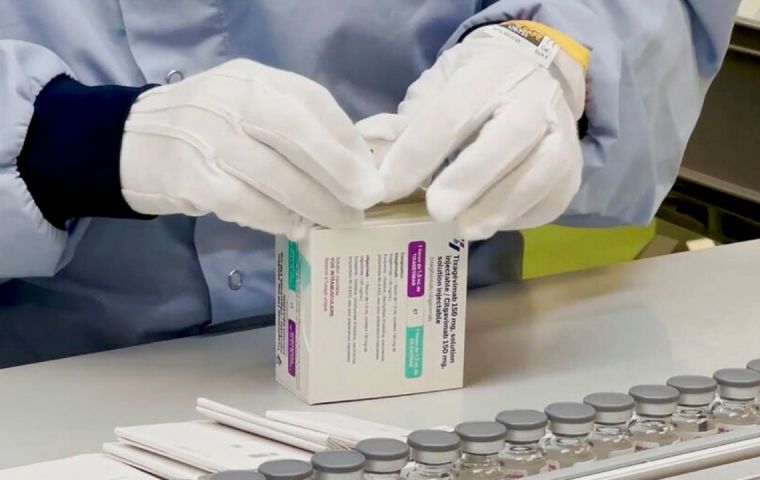MercoPress. South Atlantic News Agency
Anti COVID-19 drug authorized in US for those uneligible for vaccination
 Evusheld combines two types of synthetic antibodies (tixagevimab and cilgavimab)
Evusheld combines two types of synthetic antibodies (tixagevimab and cilgavimab) Health authorities in the United States have authorized an alternate treatment against COVID-19 for patients aged 12 and older who cannot be vaccinated for medical reasons.
The Food and Drug Administration (FDA) has granted Wednesday an emergency authorization for the use of AstraZeneca's Evusheld in people who react badly to vaccines.
However, the FDA has warned Evusheld is “not a substitute for vaccination in individuals for whom COVID-19 vaccination is recommended” and can only be authorized for people with weakened immune systems or those who cannot be vaccinated for medical reasons, such a strong allergic reaction.
The FDA also explained the treatment “may be effective for pre-exposure prevention for six months,” but it is not to be administered to people already infected with SARS-CoV-2.
The drug combines two types of synthetic antibodies (tixagevimab and cilgavimab), and is given as two intramuscular injections, one right after the other. These antibodies help the immune system fight off the virus by targeting its spike protein, which allows it to enter cells and infect them.
Side effects may include an allergic reaction, bleeding from the injection site, headache, and fatigue, it was reported.
The FDA's authorization was based on a clinical trial carried out on unvaccinated people over the age of 59, or with a chronic disease, or at high risk of infection. The drug was given to 3,500 people while 1,700 received a placebo. The treatment cut the risk of developing COVID-19 by 77%.
Two cocktails of antibodies, made by Regeneron and Eli Lilly, are currently authorized for preventive use natiowide, but only in people who have been exposed to the virus shortly before, or who have a strong chance of being exposed and are at high risk of developing a severe case of the disease.




Top Comments
Disclaimer & comment rulesCommenting for this story is now closed.
If you have a Facebook account, become a fan and comment on our Facebook Page!